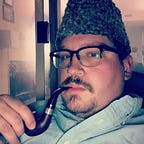Death Poems
I have always appreciated the notion of the death poem, ever since hearing of them in James Clavell’s novel Shogun.
What are clouds,
But an excuse for the sky?
What is life,
But an escape from death?
Years ago I struggled a lot with death anxiety. I would have existential crises over my own mortality, particularly when I began to doubt the existence of an afterlife. The notion of nothingness, coupled with no-self, really messed with my mind. I am here, but where do I go when I am not here? When I sleep, I dream (sometimes), but I am not always their either. Going into twilight sedation for some procedures also complicated things. I could remember being wheeled into a room for an endoscopy, the chatter of the staff, the small conversation, and then the application of the drugs, and… nothing. Maybe waking up, getting my clothes back on, but more nothing until those drugs fully wore off.
I remember my father’s parents dying. I was a teenager, and I didn’t know them as well as I’d have liked, but I remember them being old, in a hospice bed, clinging to life a few days before they were gone. I was closer to my piano teacher, Theodore Szymkuc, who everyone called “Chick”, whose studio I came back to visit, only to find he’d passed away from a heart attack a few weeks prior. I was also close to my (non-familial) uncle, who very quickly succumbed to pancreatic cancer. I visited him the day he died, told him secrets he couldn’t respond to on his deathbed, and heard that he passed shortly after we left.
“Makes no difference how I carry on
Remember, please don’t talk about me
Please don’t talk about me
Please don’t talk about me when I’m gone”
There’s an intense sense of guilt in my family about visiting people before they die, being sure you saw them one last time. It’s the reason we used to drive up to Canada every year to visit my great grandmother before she passed. It’s why I try to visit my mother’s parents as often as possible, a strange obligation born out of sorrow rather than celebration at being together again. When I saw the film Coco, the notion of the three deaths spoke to me. First, our bodies cease to function, but we are not fully dead. Then we are laid to rest, but we are not fully dead. Only when our name is spoken for the last time and forgotten are we fully dead. I think about this when I play piano and I thank Chick for all the lessons.
This guilt over death lingered with me when my children were born. If something happened to me, who would raise them as a father? Would they remember me? I felt an obligation to be there, to stand in the way of a pretender who might take my place. I still refuse to accept the notion that things will be ok without me.
“And there will come a day and youth will pass away
What will they say about me
When the end comes I know there’s a just a gigolo’s
Life goes on without me”
Even with all the efforts I’ve made to resolve this death anxiety, with being happy with life as it is and coming to terms that things do keep going without us, it rolls back. Mortality is an ugly bug, a difficult thing to shake. But I picture the stoic monks who meditated themselves into oblivion, the samurai who deliberate disembowel themselves, and admire their resolve. I remember telling one of my favorite koans to a friend just before we went over the edge of a log ride, an exercise in courage for me. I remember years later, as I was going to therapy and just before I got my first SSRI prescriptions, staring at the Chicago river, thinking about that koan and looking at the dark water.
There is nothing we can do to stop death. We fight it, sometimes in phyric victories in hospitals, until our quality of life is non-existent. We sometimes land at the thought of living for today. The Rubiyat of Omar Khayyam speaks to this directly, with a directive to imbibe with joy:
YESTERDAY This Day’s Madness did prepare;
TO-MORROW’s Silence, Triumph, or Despair:
Drink! for you not know whence you came, nor why:
Drink! for you know not why you go, nor where.
How we die is at least as important as how we live, and vice versa. Death is a part of life, and life is a part of death. We will spend more time dead than alive after all. I think this is well summed up by Ernest Dowson’s “Vitae Summa Brevis Spem Nos Vetat Incohare Longam:”
“They are not long, the weeping and the laughter,
Love and desire and hate:
I think they have no portion in us after
We pass the gate.They are not long, the days of wine and roses:
Out of a misty dream
Our path emerges for a while, then closes
Within a dream.”
It is easier for me to cite the death poems of others than to write my own. Doing so puts me in the shoes of the person ordered to commit sepukku. But I cannot stay awake all night, and I cannot live all of the days, only the ones committed to me by time. So here is my attempt at a death poem, as though the words that came before were not already some feeble grasping at that effort.
“The seed cannot be seen once the tree takes root
in the soil, and growing, bears fruit.
The tree falls, its final ring everlasting,
its withered lumber leaves seeds in passing.”
